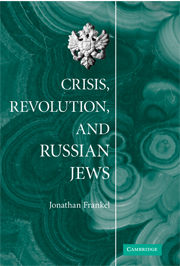Book contents
- Frontmatter
- Contents
- Acknowledgments
- Introduction
- PART I NEW DYNAMICS?
- PART II REVOLUTION AND WAR (1905–1921)
- PART III IDEOLOGICAL CONFLICT AND CONTINUITY
- PART IV OVERSEAS
- PART V HISTORY AND THE HISTORIANS
- 10 S. M. Dubnov: Historian and Ideologist
- 11 Assimilation and the Jews in Nineteenth-Century Europe: Toward a New Historiography?
- Index
10 - S. M. Dubnov: Historian and Ideologist
Published online by Cambridge University Press: 07 August 2009
- Frontmatter
- Contents
- Acknowledgments
- Introduction
- PART I NEW DYNAMICS?
- PART II REVOLUTION AND WAR (1905–1921)
- PART III IDEOLOGICAL CONFLICT AND CONTINUITY
- PART IV OVERSEAS
- PART V HISTORY AND THE HISTORIANS
- 10 S. M. Dubnov: Historian and Ideologist
- 11 Assimilation and the Jews in Nineteenth-Century Europe: Toward a New Historiography?
- Index
Summary
In the early years of this century, Simon Dubnov, then a man in his forties, was already a well-known figure in the Russian-Jewish intelligentsia. But among what was then a rapidly growing social stratum of writers, journalists, artists, men of the professions, politicians, ideologists, and revolutionaries he was not unusually prominent, certainly not famous.
Today, though, some fifty years after he was killed by the Nazis in Riga, he continues to command attention within the Jewish intellectual world, while the vast majority of his contemporaries are all but forgotten. Time has demonstrated that Dubnov enjoys two abiding claims to fame.
First, in his Letters on Old and New Jewry, which he began to publish in article form in 1897, he put forward in well-elaborated terms the theory of what is variously known as Diaspora nationalism or Jewish national autonomism. Essentially, this theory states that even with the destruction of their state in 70 C.E. and their dispersal across the world, the Jews have remained a nation (albeit “nonterritorial” in character); that until the French Revolution and emancipation, the Jews had always been granted a large measure of internal self-government in the host states; that in the modern era, they should therefore lay claim in the various countries of the Diaspora not only to civil but also to national (that is, national minority) rights; and that national autonomy would enable them not only to run their own internal (above all, educational) affairs but also to defend their political interests more effectively both at home and abroad.
- Type
- Chapter
- Information
- Crisis, Revolution, and Russian Jews , pp. 239 - 275Publisher: Cambridge University PressPrint publication year: 2008
- 1
- Cited by



